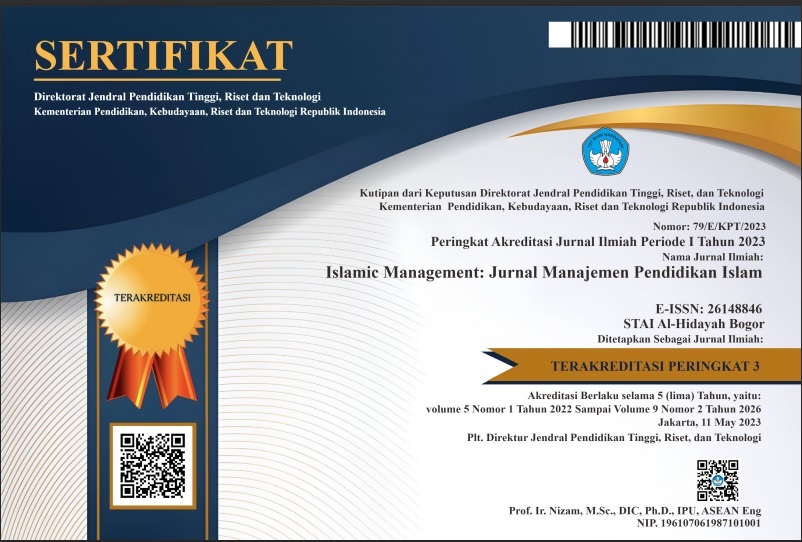Manajemen Peserta Didik Pendidikan Islam
DOI:
https://doi.org/10.30868/im.v5i01.1991Abstract
References
Ahmad, T. 2006. Filsafat Pendidikan Islami, Integrasi Jasmani, Rohani dan Kalbu, Memanusiakan Manusia. Bandung: Remaja Rosda Karya.
Chadidjah, S., & Erihadiana, M. 2020. Manajemen Peserta Didik Pada Mdta Al-Wahda Terunggul Di Kota Bandung.
Firdaus, M. A. 2020. Pendidikan Akhlak Pendidikan Akhlak Karimah Berbasis Kultur Pesantren. Jurnal Pendidikan Islam, 11(2), 136–151.
Hadiyanto, H. 2013. Manajemen Peserta Didik Bernuansa Pendidikan Karakter.
Hasbiyallah., Nayif, S. 2019. Pengelolaan Pendidikan Islam Teori dan Praktik. Rosdakarya.
Ian Craib. 1986. Teori-Teori Sosial Modern. Rajawali Press.
Imron, A. 2011. Manajemen peserta didik berbasis sekolah. Jakarta: Bumi Aksara.
Maliki, Z. 2008. Sosiologi Pendidikan (Yogyakarta. Gadjah Mada University Press.
Nata, A., & Fauzan. 2005. filsafat pendidikan Islam. Gaya Media Pratama.
Nurochim, N. 2016. Sekolah berbasis pesantren sebagai salah satu model pendidikan Islam dalam konsepsi perubahan sosial. Al-Tahrir: Jurnal Pemikiran Islam, 16(1), 69–88.
Ritzer, G. 2004. Sosiologi ilmu pengetahuan berparadigma ganda.
Surya, P. 2011. Educational management, handbook for school of education student. Yogyakarta State University.
Tafsir, A. 2011. Ilmu pendidikan dalam perspektif Islam. Rosdakarya.
Downloads
Published
How to Cite
Issue
Section
Citation Check
License
Authors who publish with this journal agree to the following terms:
- Authors retain copyright and grant the journal right of first publication with the work simultaneously licensed under a Creative Commons Attribution License that allows others to share the work with an acknowledgment of the work's authorship and initial publication in this journal.
- Authors are able to enter into separate, additional contractual arrangements for the non-exclusive distribution of the journal's published version of the work (e.g., post it to an institutional repository or publish it in a book), with an acknowledgment of its initial publication in this journal.
- Authors are permitted and encouraged to post their work online (e.g., in institutional repositories or on their website) prior to and during the submission process, as it can lead to productive exchanges, as well as earlier and greater citation of published work (See The Effect of Open Access).







